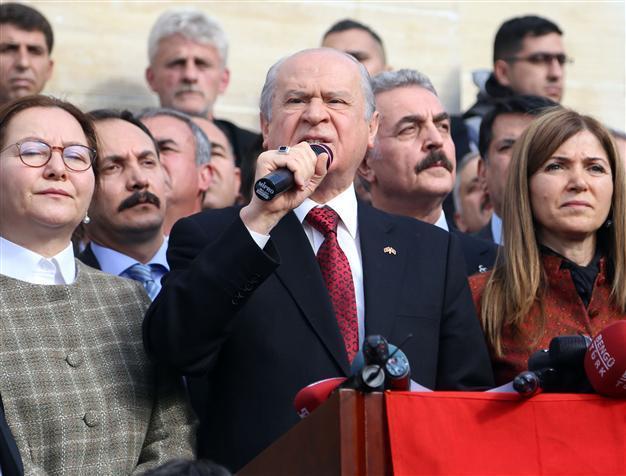MHP’s Bahçeli cuts Tunceli visit short upon protests
TUNCELİ

AA Photo
Turkey’s main nationalist leader was forced to cut short a controversial visit to the eastern Anatolian province of Tunceli (Dersim) upon protests from residents infuriated with his remarks declaring their ancestors who participated in a rebellion as “terrorists.”
“No matter in which place in the world, a legitimate state, which has its people’s confidence and support, is obliged to prevent and eliminate dangers posed at it. In this respect, incidents that unfolded in Tunceli in 1937-1938 are a rebellion and those involved in the rebellion are the then-separatist terrorists. Considering them in relation with the children of Karbala, whom we admire, and offering apologies to them is both an insult and derogation,” Nationalist Movement Party (MHP) leader Devlet Bahçeli said Nov. 28, as he delivered a speech in front of the governor’s office surrounded by intense security measures.
Later, Bahçeli was originally scheduled to proceed to a cemevi, the Alevi house of worship, but protesters blocked the road to the cemevi with barricades, and turmoil erupted after a police attack.
Bahçeli was thus forced to cancel visits with shopkeepers – many of whom had refused to open their shops in protest at Bahçeli’s visit – as well as the trip to the cemevi, instead performing Friday prayers at the province’s largely unused mosque before departing.
With his remarks citing “the children of Karbala,” Bahçeli criticized Prime Minister Ahmet Davutoğlu who earlier dubbed the Dersim massacre as a “modern-day Karbala.”
The Battle of Karbala of 680 A.D., the supporters and relatives of the Prophet Muhammad’s grandson Husayn ibn Ali were all killed by the forces of Yazid I, the Sunni Umayyad caliph, who Husayn refused to recognize as caliph. The dead are regarded as martyrs by Muslims, and the battle has a central place in Alevi and Shiite history and tradition.
The debate over the Dersim massacres was sparked after a deputy chair of the main opposition Republican People’s Party (CHP) apologized for the tragic events in the predominantly Alevi-populated Dersim. In Dersim, now known as Tunceli, over 13,000 people were killed during a military operation to quash an apparent Kurdish tribal rebellion during the CHP’s single-party rule. Seyid Rıza, the leader of the movement, was executed in 1937.
Bahçeli was prompted to pay the contentious visit following a challenge by Davutoğlu who had challenged him to go to Dersim “if he had the courage to do so” and suggested that he would not be able to reiterate his arguments on the Dersim debate if he met with residents of the province.
Bahçeli had earlier slammed Davutoğlu’s recent visit to Tunceli, claiming that he had engaged in “treason” for expressing condolences for the victims of the Dersim massacre.
In Ankara on the same day before Bahçeli was to leave for Dersim, Davutoğlu was pungent when asked to comment.
“I wish he wouldn’t have waited for our call to travel to Tunceli,” Davutoğlu told reporters in Ankara, while Bahçeli, speaking in Dersim, called on Davutoğlu to resign.
Peoples’ Democratic Party (HDP) co-leader Selahattin Demirtaş, in an interview aired late on Nov. 27, argued that Bahçeli went to challenge the people of Dersim, not Davutoğlu.
In an apparent reference to a joint statement in which some 30 Alevi civil society organizations from Turkey and Europe declared Bahçeli unwelcome in the city, Demirtaş told CNNTürk that the anger needed to be comprehended.
“A challenge vowing to reiterate in Dersim his earlier insults against the people of Dersim’s grievances and historical wounds is not directed toward the prime minister. It is a challenge against Dersim’s people,” Demirtaş said.
